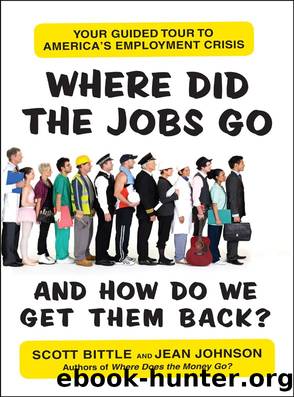Where Did the Jobs Go--And How Do We Get Them Back?: Your Guided Tour to America's Employment Crisis by Scott Bittle & Jean Johnson

Author:Scott Bittle & Jean Johnson [Bittle, Scott & Johnson, Jean]
Language: eng
Format: epub
Tags: Public Policy, Social Policy, Immigration, Political Science, World, General
ISBN: 9780062096678
Google: RJhosILJVFQC
Goodreads: 13621508
Publisher: William Morrow Paperbacks
Published: 2012-01-31T00:00:00+00:00
PUNISH THE RICH OR REDUCE POVERTY?
Probably the most powerful argument experts in this group make is that trying to narrow the income gap is the wrong goal. The Cato Instituteâs Michael Tanner writes that âincome inequality is the wrong focus for government policy. After all, if we doubled the income of every American tomorrow, inequality would actually increaseâbut we would also lift a lot of Americans out of poverty.â38 That, Tanner says, should be the objective: ânot punishing the rich, but reducing poverty.â39 The way to do that, many would argue, is to encourage economic growth, spur job creation, improve education, and ensure that people can move up the economic ladder if they have the talent and the drive.
Throughout these pages, weâve returned to the same question again and again: what are the best ways to rev up the jobs engine and get the economy back to where we want it to be? We canât do everything; we have to make choices. Maybe curbing executive pay would prompt CEOs to focus more on the future. Maybe higher taxes on wealthier Americans are both fair and warranted. But if we choose to do these things, is it because they reduce the income gap? Or is it because they are good ideas that are likely to lead to good results for the job market?
Like many of the topics weâve covered, thereâs a subtle equation here. By itself, reducing the income gap may or may not be the best path out of our jobs problem. But even if there are other, better ways to stimulate job growth, that doesnât mean that the income gap doesnât matter at all.
In fact, the income gap matters for a lot of reasons. When we were researching this chapter, we were struck by this statement from the OECD, which looks at income trends internationally: âGrowing inequality is divisive. It polarizes societies, it divides regions within countries, and it carves up the world between rich and poor. Greater income inequality stifles upward mobility between generations, making it harder for talented and hard-working people to get the rewards they deserve. Ignoring increasing inequality is not an option.â40
In the end, ignoring the income gap will probably come back to bite us. But that doesnât mean that focusing solely on reducing the gap will pay off when it comes to getting the jobs we want.
Download
This site does not store any files on its server. We only index and link to content provided by other sites. Please contact the content providers to delete copyright contents if any and email us, we'll remove relevant links or contents immediately.
The Secret History by Donna Tartt(19058)
The Social Justice Warrior Handbook by Lisa De Pasquale(12187)
Thirteen Reasons Why by Jay Asher(8894)
This Is How You Lose Her by Junot Diaz(6877)
Weapons of Math Destruction by Cathy O'Neil(6267)
Zero to One by Peter Thiel(5789)
Beartown by Fredrik Backman(5737)
The Myth of the Strong Leader by Archie Brown(5500)
The Fire Next Time by James Baldwin(5432)
How Democracies Die by Steven Levitsky & Daniel Ziblatt(5216)
Promise Me, Dad by Joe Biden(5146)
Stone's Rules by Roger Stone(5081)
A Higher Loyalty: Truth, Lies, and Leadership by James Comey(4955)
100 Deadly Skills by Clint Emerson(4921)
Rise and Kill First by Ronen Bergman(4780)
Secrecy World by Jake Bernstein(4743)
The David Icke Guide to the Global Conspiracy (and how to end it) by David Icke(4709)
The Farm by Tom Rob Smith(4502)
The Doomsday Machine by Daniel Ellsberg(4485)
